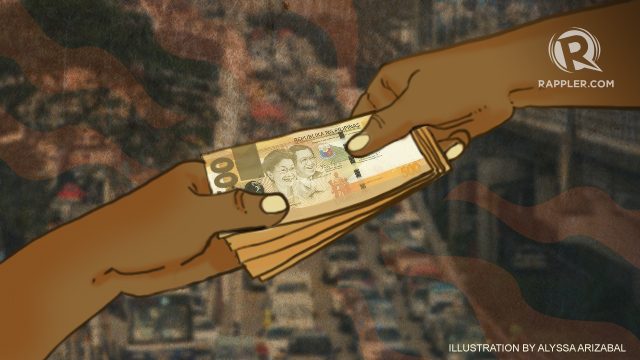SUMMARY
This is AI generated summarization, which may have errors. For context, always refer to the full article.

In a recent Rappler article about corruption at the Land Transportation Office (LTO), “Corruption at LTO, LTFRB: Unfit drivers, vehicles on the road”, we read the story of “Rica”, the fictitiously named liaison officer for a law firm, who secures franchises and related documents from LTO and LTFRB for one of the firm’s clients, a large trucking company. According to the story, Rica knows the ins and outs of corruption at these agencies.
At first, like many Filipinos, I felt angry, frustrated by the sheer level of corruption being described. I thought “If it’s that deeply ingrained in the government system, how can it ever be defeated?”
But as I read further, I started to realize something – nowhere in this story does Rica ever say that anyone demanded an illicit payment. The closest she comes is a statement that “some employees would hint at the need for a bribe”. In truth, the whole need for payment seems to just be understood.
Rica complains that she pays P500-P1500 for speedy processing, plus P1000 per truck to the LTFRB lawyer assigned to the hearing, and P500-P1500 (plus food!) each time she follows up on a case. She says she always makes sure to bring P20,000 to P600,000 whenever she transacts with these offices.
But I don’t get the impression from this story that there is ever an actual demand for payment. It looks like Rica is just operating on auto-pilot, greasing palms as she goes, all on her own. I don’t doubt that the process might be made artificially slower to encourage payment, but I wonder if that will actually happen, or if Rica is really just paying to be moved to the front of the line.
In Rica’s story, other than the above-mentioned “hint at the need for a bribe”, the whole practice of under-the-table payment seems to be driven entirely by her, the customer.
Now, I’m not stupid. I know that corruption is rampant in these agencies, as it is throughout the Philippine government bureaucracy, and that clear, unambiguous demands for under-the-table payment are made all the time. But I wonder, how much of the extortion we read about every day is actually demanded, and how much is just given blindly and automatically? And what would really happen if we just stopped doing that?

SOPs in government offices?
Several years ago, I worked as security manager at the original Oakwood in Makati. Every year we went through a variety of inspections from government offices, including the Bureau of Fire Protection, and every year our accounting office would prepare a small envelope of cash, which I was told to give discreetly to the lead inspector. Not to cover up any violations, because we were always in compliance with safety laws, but rather “because it’s expected”. I always asked if this payment was demanded, and was always told “no, but it’s necessary”.
Again, I’m not stupid. I understand that payment is always expected in these situations. But is it possible that it’s always expected because we always give? When a policeman stops you for a traffic violation, and you automatically offer a bribe (or just hand him your little green license wallet with a little cash tucked inside), can you really say that the policeman demanded payment, or that payment was the only option?
I was once stopped in Makati for beating a red light. Maybe I did, I really wasn’t sure, but in any case I wasn’t going to give the cop any money. So for the next 15 minutes, we were locked in a stalemate. The exchange went something like this —
Cop: “I have to write you a ticket and confiscate your license.”
Me: “Ok, go ahead. If I broke the law, I should get a ticket.”
Cop: “But it will be very inconvenient for you. You’ll waste a whole day reclaiming your license.”
Me: “That’s ok. I prefer to do it the right way.”
Cop: “I really don’t want to cause you trouble.”
Me: “Then just let me go on my way.”
Cop: “I can’t do that. I have to write a ticket.”
Me: “Then write me a ticket.”
Cop: “But it will be a problem for you.”
Me: “Either write me a ticket or let me go. My takeout food is getting cold.”
We went back and forth like that for a while. In the end, he let me go without a ticket and I didn’t pay a thing. But I would have been perfectly willing to go through the inconvenience of having to reclaim my license and pay the proper fine.
Extortion and bribery
This brings up another issue in the corruption paradigm. We rant and rave about how crooked the cops are for extorting money from us, but in many cases, it’s not actually extortion; it’s bribery. There’s a difference – Extortion is demanded, bribery is offered. In many cases of government corruption, especially at the lower levels, it’s actually we who offer payment (in other words, a bribe) to allow us to get away with breaking a law, rule, or procedure, or simply for our convenience. Who is the real bad guy there?
This brings us back to Rica and LTO. Right after Rica talks about some government employees “hinting at the need for a bribe”, she says “That’s why there are many buses, vans, and other PUVs that get franchises even if they have dilapidated and unserviceable units.”
Rica is clearly not talking about a demand for payment (extortion) to secure a franchise for a qualified vehicle. She’s talking about paying a bribe to register a vehicle that should not be registered. And she’s saying this while, in the same breath, complaining about how corruption at the agency “bleeds you dry”.
So what would happen if Rica didn’t automatically pay her bribes? If everyone stopped giving money or food whenever they followed up on the progress of their cases, would government clerks suddenly lose the paperwork of every single customer? They might try, but I doubt they could keep that up for very long.
And what would happen if every driver suddenly started demanding a ticket whenever a policemen stopped them? Just accept the inconvenience and refuse to pay a bribe. Would cops keep making up bogus violations if there was no money to be made?
I’m not sure, but I guarantee one thing. Extortion by government officials would be a lot less of a problem if we stopped making it so easy for them. – Rappler.com
Michael Brown is a retired member of the US Air Force, and has lived over 16 years in the Philippines. He writes on English, traffic management, law enforcement, and government. Follow him on Twitter at @M_i_c_h_a_e_l
Add a comment
How does this make you feel?
There are no comments yet. Add your comment to start the conversation.